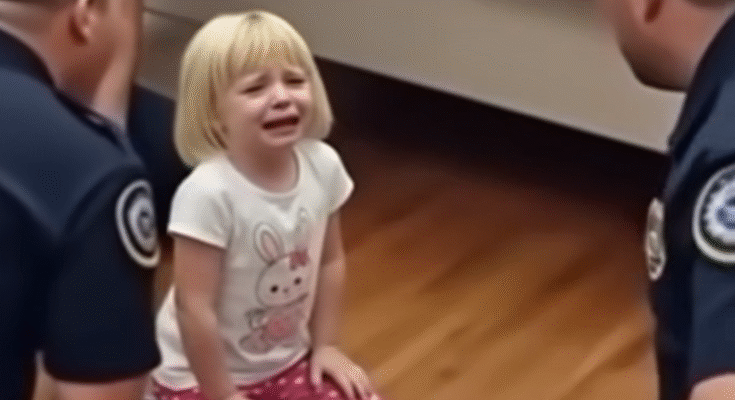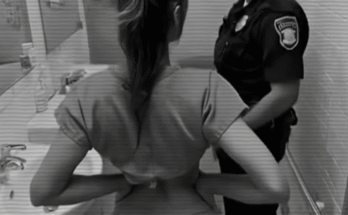Late one evening, 6-year-old Olivia called emergency services in a trembling whisper: “Please come… there’s someone under my bed. I’m really scared.”
Her voice wavered, her small fingers gripping the old landline phone so tightly that her knuckles turned pale. The dispatcher, a woman with years of experience and an instinct for recognizing genuine fear, immediately hushed her own voice into something soft, calming, like a lullaby.
Earlier that night, when she insisted there was movement in her room, they reassured her there was nothing to fear. “Just shadows,” her father had said while clicking on a nightlight. “Dreams can feel real,” her mother added gently, tucking the blanket around her. But Olivia’s wide, watery eyes had lingered on the dark space beneath the bed.
He knelt, crouching low, and flicked his flashlight beneath the bed. Dust bunnies, a few scattered toys, and a forgotten sock stared back. He leaned further, sweeping the light slowly. Nothing.
He straightened up, offering a kind smile. “All clear, sweetheart. Just toys down there.”
Olivia’s face, however, didn’t soften. She looked from him to the bed, as though she still didn’t believe.
The older officer, who had remained quiet, raised a hand slightly, motioning for silence. He had noticed something—something subtle. A sound. The faintest vibration in the floorboards, almost imperceptible. His head tilted.
And then the entire house fell eerily still.
It wasn’t the quiet of a calm night. It was a silence that felt heavy, pressing. Even the refrigerator hum seemed to vanish. The parents froze. Olivia clutched her teddy so tightly its stuffing seemed ready to burst.
The officer slowly straightened, scanning the room. His eyes darted not to the bed again but to the window.
“Sir,” he said to his partner softly, “check the locks.”
The second officer moved, testing the latch. Secure. He then looked toward the closet door, slightly ajar. He stepped forward and nudged it open with his flashlight beam. Only coats, shoes, and a box of board games.
The sound came again, faint but undeniable. A creak, as if someone had shifted their weight across the old wooden floorboards of the hallway. But everyone was already in the room.
“Ma’am, sir,” the older officer said quietly but firmly. “I need you both to take Olivia into the living room. Please stay there.”
The parents hesitated, confusion written across their faces.
“Now,” he repeated.
Something in his tone left no room for argument.
Olivia’s father scooped her into his arms, and her mother quickly followed as they retreated down the hall. Olivia buried her face into her father’s shoulder, but not before whispering again, “I told you someone was here.”

The officers, now alone in the bedroom, listened. One kept his hand near his w.3.a.pon but hadn’t drawn it. They weren’t certain yet. The silence stretched, interrupted only by the soft ticking of a clock on the dresser.
The older one shook his head. “Houses don’t settle like that.”
Together, they swept the upstairs floor, checking each room, each corner, each closet. Every window was locked, every door secure. Yet the feeling remained—that unsettling certainty that the house wasn’t empty.
Inside, Olivia remained curled on the couch, still clutching her teddy. Her parents kissed her forehead, whispering reassurances, though their eyes betrayed unease. For Olivia, the world felt split in two that night. On one side, the warm comfort of her family’s home. On the other, the lurking shadow of what she had felt beneath her bed—not just fear, but certainty.
The following days carried on with a fragile normalcy. Her parents brushed off the incident, telling neighbors it was just a false alarm, the kind that happens when kids have wild imaginations. But the officers kept their promise. Patrol cars lingered near the cul-de-sac, keeping quiet watch. Olivia, however, couldn’t shake it. At night, she kept her teddy close and refused to sleep in her own room, instead curling up on the living room couch. When her parents gently encouraged her to go back upstairs, her small face would harden.
Her parents exchanged worried looks.
One afternoon, while Olivia was at school, her father decided to finally prove to her that there was nothing wrong. He pulled everything from beneath her bed, vacuumed the dust, and even sprinkled flour on the floorboards to show her no footprints would appear. That evening, he proudly revealed the spotless room to her.
“See? Nothing there. Clean as can be.”
Olivia only glanced at the floor, then shook her head. “It doesn’t matter. They don’t walk in the day.”
Her father frowned but said nothing more. Weeks passed. Then one night, long after midnight, the silence of the neighborhood was broken again—but this time, not by a frightened child’s call.
The same officers who had responded before were called back to the street. A break-in had occurred two houses down. A family startled awake had found their kitchen door ajar, muddy footprints trailing across the tile. Jewelry and cash were missing.



